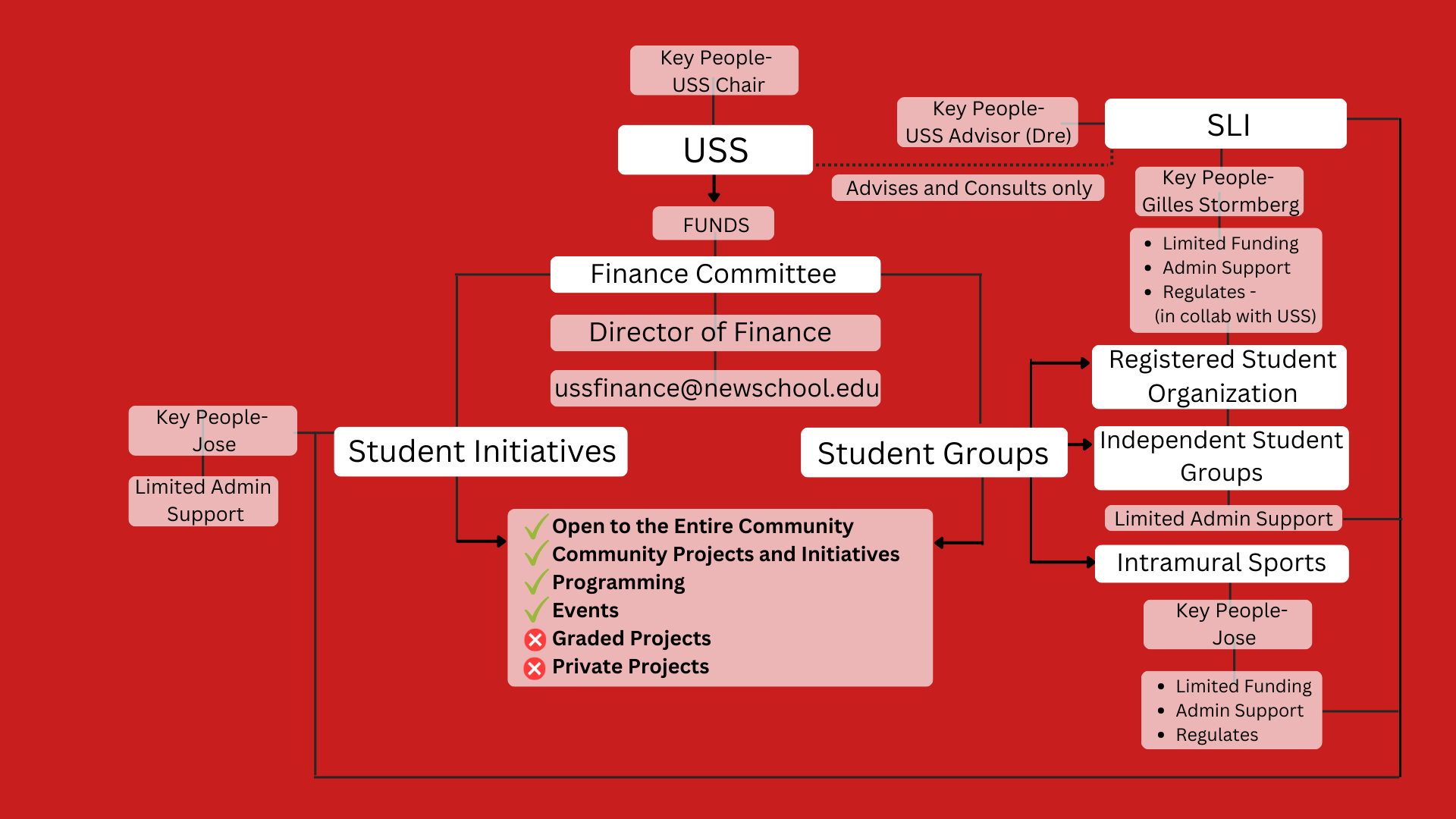FAQs
What is the Student Senate?
The University Student Senate (USS) is the official student government of the New School. For students by students, we operate independently of the administration and consist of Student Senators elected to represent all five colleges of our community. No matter what structural changes may be coming, we are constantly working to ensure that every student is represented on the University Student Senate.
What is the mission of the USS?
The mission of the USS is threefold: achieving true shared governance; effectively supporting and safeguarding community life and student resources; advocating for students from all backgrounds and departments.
What is a Senator?
A Senator is the name for the students who are elected to serve as your representatives within the university's student government. They are distinguished by their schools. For example: a student elected from Parsons would be a Senator for Parsons. Or a Parsons Senator on the University Student Senate. Senators have a wide range of duties and responsibilities: they serve as a voice for their fellow students, advocating for their needs, concerns, and interests within the university’s decision-making processes and supporting their right to a vibrant community life. Student senators participate in meetings, propose and vote on policies, allocate funds for student initiatives, and work to improve campus life and academic experiences for their peers.
These responsibilities are also further distinguished by the committees they serve on. For example, senators who serve on the finance committee, might also have funding related duties. Additionally, you might also find a Senator serving on the Engagement committee working at one of the many events that we host as the University Student Senate. Senators also serve sometimes on shared governance committees where they collaborate and engage in discussion with University officials to discuss broader issues that involve multiple stakeholders of the school.
However, no matter what the responsibilities of a particular Senator might be, their primary job is to listen to you. If you would like to learn more about or contact your representative, you can find them here — hyperlink meet ur senators page.
What is the structure of the Senate?
The Senate consists of the Executive Board and the Representative Board. The Executive Board exists to facilitate coordination and collaboration, and represents the whole Senate at certain high-level meetings. The Representative Board is further divided into four committees: Finance, Engagement, Communications, and Engagement.
What are Elections?
Elections are the process by which the entire student body is invited to select their representatives for the next Senate. USS Elections usually take place during the second quarter of the Spring Semester. Before every election, we send out a University wide email, announcing the process that will take place. As a general rule, each election will consist of the following periods: candidacy registration, campaigning, voting, results announcement, and inauguration. These periods usually last for one to two weeks. Students will vote for their representatives based on their school. Students in dual college programs will select one school they will vote in.
Who can run for a Senator position?
Go into constitution and find the about eligibility. “Good academic standing” etc.
What are Special Elections?
Special Elections are a part of the regular constitutional process of the Senate that takes place when there are open seats on the Senate from the regular election cycle, which happens annually at the end of the Spring semester. The Senate depends on its Senators to carry out our mission and even if we are down a few Senators it severely hinders our ability to carry out vital functions. The Special Elections were designed to both address this issue of short-staffing as well as with the goal of inclusivity and a commitment to our democratic process in mind to allow first-year students and other eligible students who were not able to run for Senator in the regular election cycle for any reason a chance to join our ranks.
What about the open positions that are still unfilled?
The USS Constitution contains provisions that allow us to expediently fill vacancies should they occur. Upon the vacancy of a Senator position, the USS will first contact any runner ups of that position. Should all runner ups be exhausted, we welcome any interested students who would like to fill an open seat in their division to gather 50 students signatures from their college and present their petition at a Senate meeting.
We understand the frustration of students, particularly in divisions such as COPA, of seats in your division being chronically unfilled. The 2025-26 Senate is currently working with administration to find ways of effectively addressing this long standing representation issue. If you have any thoughts or comments on ways we can achieve full representation, they are always welcome at uss@newschool.edu.
Why are there delays sometimes?
Much like many organizations on campus, we are limited by bureaucratic and logistical constraints. We also rely on University Staff to carry out certain functions. Sometimes, an issue may arise or lapse in communication that may occur between University staff resulting in delays or adjustments to election processes anywhere from two days up to two weeks. Election procedures may be effected as well. We will keep you updated should anything occur, and we appreciate your patience and understanding.
Who can vote?
Students from Lang, Parsons, NSSR, and CoPA can only vote for USS positions within their college division. Students can only vote for an amount of candidates equal to the amount of open positions. They can also vote none if they do not prefer any of the candidates. Students who belong to more than one position must choose the candidates of one division to vote for.
How do I vote?
NarwhalNation has historically been the preferred platform for all USS elections. In order to vote in USS elections, please ensure that you have proper access to NarwhalNation under your original New School email address (not your alias). The voting form for the elections can be found in the forms sections of the NarwhalNation’s website, you may find it on the left sidebar. The notification and link to the voting form will also be sent out through our various communications, made available in the header of the NarwhalNation home page, and displayed prominently in our various other USS promotional materials related to the election. Once voting for the 2025 Elections will be live, you will also be able to access it through a link here.
If you are experiencing issues with the voting form, it may be because you have more than one NarwhalNation account logged in on your computer. Open an incognito tab on your browser to log into NarwhalNation under your original New School email address and try accessing the form again. If you still experience issues, please email us at USS@newschool.edu.
What is the difference between USS, SLI, RSOs?
We understand that acronyms can be confusing! So we created a helpful chart to help you understand the distinctions. Ultimately, the USS and SLI are distinct organizations that overlap in minor areas where we collaborate.
What are committees?
Committees are subdivisions of the Senate that supplement and enhance the work of Senators. Each committee provides a focused space for Senators to hone in on issues that relate to the three main areas of our mission.
The Finance Committee manages the $8 we receive from each student per semester and uses for internal funding that supports Senate Initiatives and the regular functioning of the USS, as well as external funding for students and student organizations. They also work to ensure the financial accountability of the Students and Student Initiatives that we fund, and advises the Senate on our semesterly budget.
The Engagement Committee oversees a long running roster of collaborative projects, regular Senate programming, and provides logistical event planning support for Senator and Senate Initiatives. They also work with students and Student Groups to find strategies and methods to increase community engagement and ensure the longevity of student projects in collaboration with other Committees.
The Communications Committee addresses the promotional and communication needs of the other three committees and provides support to the wider Senate in any additional communications responsibilities. The Committee also manages the biweekly USS newsletter and social media platforms.
Lastly, the Advocacy Committee actively listens to and catalogs emerging, current, and longstanding needs in the student community. Formulating strategies, campaigns, and plans to effectively address them, as well as bring them to the attention of the wider Senate.
What is shared governance?
Shared Governance is the ultimate and long-term goal of the Senate. Shared Governance at its root is effective and enshrined student involvement in all important University decision-making processes. Achievements in shared governance have included the creation of Student Trustees serving on the Board of Trustees and Senators seated on important committees governing specific processes of the University such as Academic Policy and allocating Emergency Funding to in-need students. It is a slow and involved process but an unwavering commitment of the USS.
Created by Linfei Yang, Director of Operations ‘23-’24

